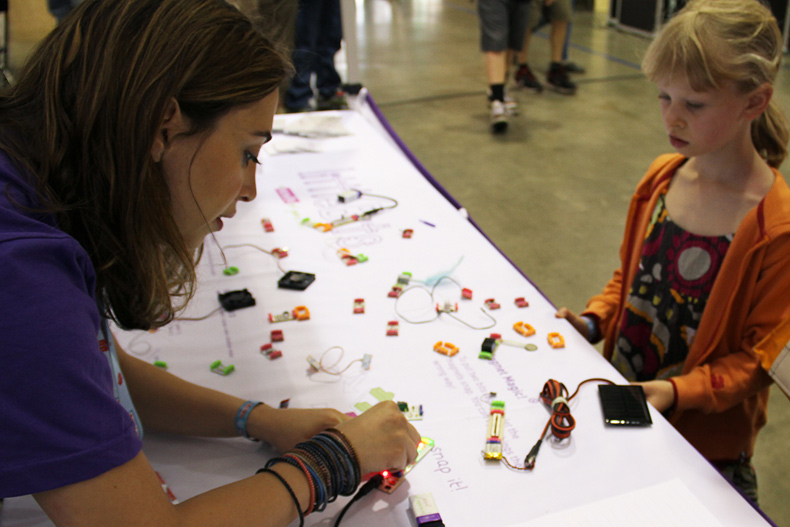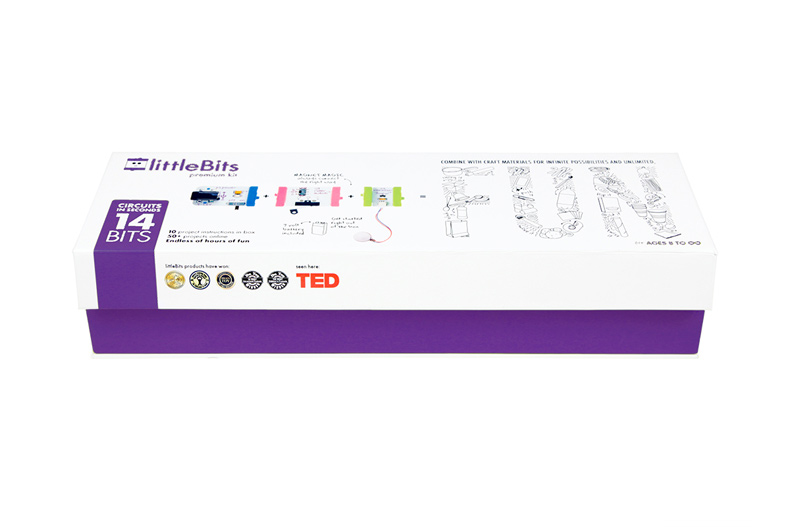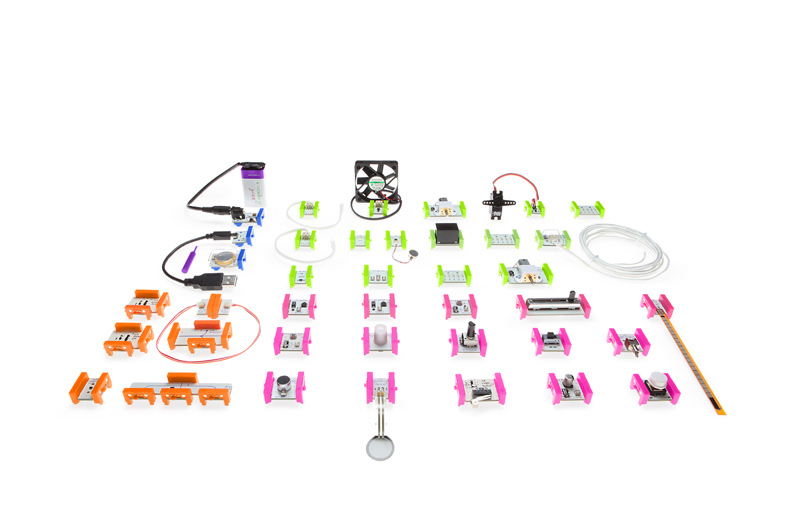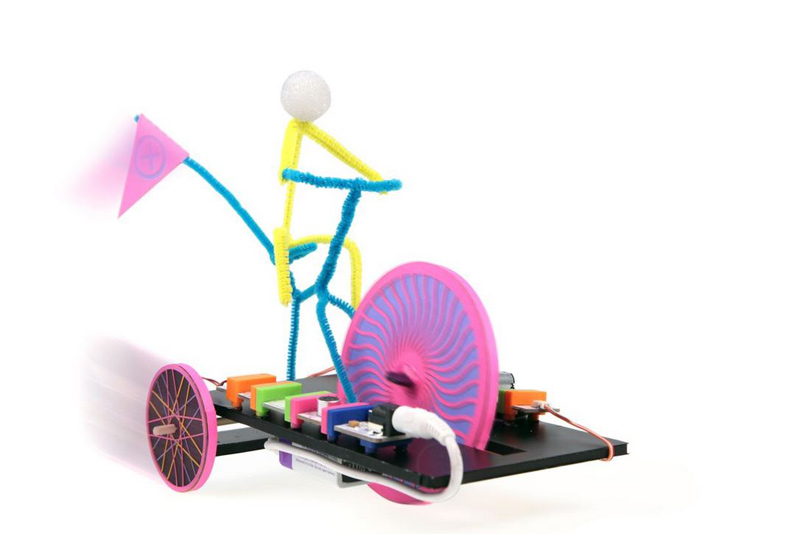Sep 16, 2013 8 Questions With: Ayah Bdeir of littleBits
One of our Imprint incubees spoke alongside Ayah Bdeir, founder and CEO of littleBits, at the Maker Panel at the New York Women Entrepreneur Festival last year. I personally fell in love with the littleBits story, adore the product line and brand intention, and wanted to feature Ayah’s perspectives as a flourishing entrepreneur. littleBits is an open source library of electronic modules that snap together with magnets for prototyping, learning and fun. Ayah and her team believe we need to create the next generation problem-solvers, and interventions need to occur early. With a growing number of available modules, littleBits (“a littleBit of geeky fun”) aims to move electronics from late stages of the design process to its earliest ones, and from the hands of experts, to those of artists, makers, students and designers. All of this changing the relationship kids have with technology and science. And guided by an open source philosophy, littleBits can become a platform for the creative process. Just a few years after the first littleBits prototype, the company was incepted in 2011. With an impressive slate of investors, dozens of toy awards, a TED fellowship, an addition to MoMA’s permanent collection, presence in 400 schools, and global sales to 80 countries so far, Ayah and littleBits are more than a just a little bit extraordinary.
Tell us about how you became inspired to develop littleBits to create the next generation of problem solvers?
I developed the early versions of littleBits as part of a project to help industrial designers improve the prototyping process. More often than not, in developing a new piece of hardware technology, the engineers have at it first, then the designers come in and put a shell around the hardware, and the design process becomes about masking or just beautifying. I felt like that was a very inorganic and very inefficient process, and made for poorly designed products. littleBits was originally a prototyping tool that designers could use early on in brainstorming in order to integrate light, sound, sensors, etc. into their mockups. This allowed designers to brainstorm using their regular materials in addition to the material of “interaction”, and most importantly, allow the designers to iterate.
The education angle came when we first began demoing the product. Kids started hovering around the exhibit. Seeing them engage with the modules was a light bulb moment. I realized there was a very big opportunity to change the way kids learn about Science and Technology, and change the relationship they had with technology. littleBits enables kids to participate in the invention and creation process: they come up with ideas, test them out, then take them apart and do something else. Essentially, littleBits allows kids at a very young age to become innovators and problem-solvers.
Your journey so far has been incredibly impressive. Has the reception and community enthusiasm been what you expected?
Everything I expected and more. In fact, I did not initially set out to start a company. I made the first prototypes of littleBits and put them up on my website. Then they got picked up by a friend’s blog. The next thing I know, my friend got re-blogged by engadget and I had thousands of emails from people around the world wanting to buy it. This was in early 2008 and there was nothing but a prototype on my desk. I slowly became more and more engulfed in making the product, and throughout the three years after that, would get emails from people wanting to buy it and use it. Every time the going got tough, and there were too many obstacles that made me consider quitting, I would get an email that would give me a jolt. Then finally in 2011, I started a company; we put the first products on the market in Dec 2011, and sold out within 2 weeks. We spent most of 2012 scaling up production because we had more interest than we could handle. Now that we have solved this problem, it’s nice to know that orders from all over the world are no longer stressful, but on the contrary, exciting! We sell in 80 countries and on September 14, we also hosted a global makeathon where people from over 17 cities signed up from around the world to host their own littleBits makeathons and come together as a community to make something that does something. littleBits has also been recognized with over 20 toy and education awards and we are in over 400 schools.
Can you impart some entrepreneur lessons you’ve learned so far with the inception of littleBits?
Don’t give up. Developing something new that never existed before takes time. And solving real problems takes time. Devote time to your passion. And don’t start a company just for the sake of starting a company. You should only start a company if you are obsessed about a problem and starting a company is the only way to attempt to solve it.
What has been the best thing about the growth of your business to date?
I love going to events, demos, and workshops and seeing people use littleBits. I love seeing their faces light up—whether they’re young or old, the reaction is the same. First there’s this moment of wonder, followed by this moment of comprehension, and then comes the amazing moment of empowerment. You see them realize what they have the power to do themselves. I love seeing this happen. Now that we have grown, I get to see this on a global scale, from Australia to Portugal to Tokyo to Minnesota, in communities where we don’t even have a presence. There are hundreds and thousands of videos and images online of people that are interacting with littleBits and getting excited in different ways, making things, learning things, sharing things. It’s very humbling.
What is your favorite littleBits product?
In terms of complete product, our new Premium Kit is a really strong product. It takes a few seconds to get started with it, and immediately you’re on to making great mechanical, and responsive projects like an interactive piggy bank. As for a Bit module, my absolute favorite is the light wire. It’s like a safe version of neon and it makes people so excited about creating their own signs, glowing clothes and disco spaces. It’s really fun!
littleBits is launching three new Exploration Kits on September 14. The Base Kit ($99), the Premium Kit ($149) and the Deluxe Kit ($199) include an assortment of bits (10, 14 and 18, respectively) and a project booklet with information on building simple circuits and step-by-step instructions for multiple projects. The Kits are designed to instantly kick-start the creativity of children and adults and inspire a new generation of innovators.
Where would you like to take littleBits long term?
I would like to see littleBits in every household, every design studio, every school and it to be used in the creative process. Not so much from a business standpoint (although it would be awesome to have that kind of success!), but also because I see littleBits not as product, but as a tool and a platform. It would be amazing to see all the different projects, products and installations it would enable and catalyze.
How important is the open source movement to innovation?
Very important. The open source movement is believed to have emerged as a reaction to patent and copyright culture. But I would argue that the open source movement was always there. Over decades, it’s how we as societies have shared ideas, built on top of each other, and created groundbreaking, complex innovations. Either way, now that the culture of large companies is to spend billions of dollars towards protecting ideas they may or may not implement, it is even more important for the open source community to rise and grow. littleBits is open source, you can download all the design files, make the circuits yourself, learn from them and make suggestions. We’ve had people email us to say they used our sensor circuit to design their own biomedical device, used our designs in an electronics class and even people who have pointed out a bug. We think sharing designs makes for a more robust product and a better experience for the curious, and hopefully gets more people excited about innovating themselves.
As a child, what did you aspire to be?
I wanted to be an architect but my parents and teachers said I owed it to myself to be an engineer because I was good at math and science. I did what they wanted, but I hated it and spent all my time trying to think of how to make it into something I liked. I wanted to do a double major in design, but couldn’t so I sat in on classes with my two older sisters. After undergrad, I applied for one graduate school and planned to keep applying until I got in. That was the MIT Media Lab, and it was because I felt like the Lab brought together amazing advances in engineering with great ideas of design and social change.
Where do you find personal inspiration? Design inspiration?
I’m constantly inspired by everything around me. Whether I’m at an art gallery or a hardware store or watching Top Chef, I’ll see something that inspires me and I’ll email it to everyone in the company. We all do this, so I’d say our innovation is a combination of people and process. We inspire each other and iterate. One of the most important truths we live by is that disciplines are dead, and the most interesting ideas are often at the intersections.
For more great Imprint content, be sure to follow us on Twitter, Instagram, and Facebook!






